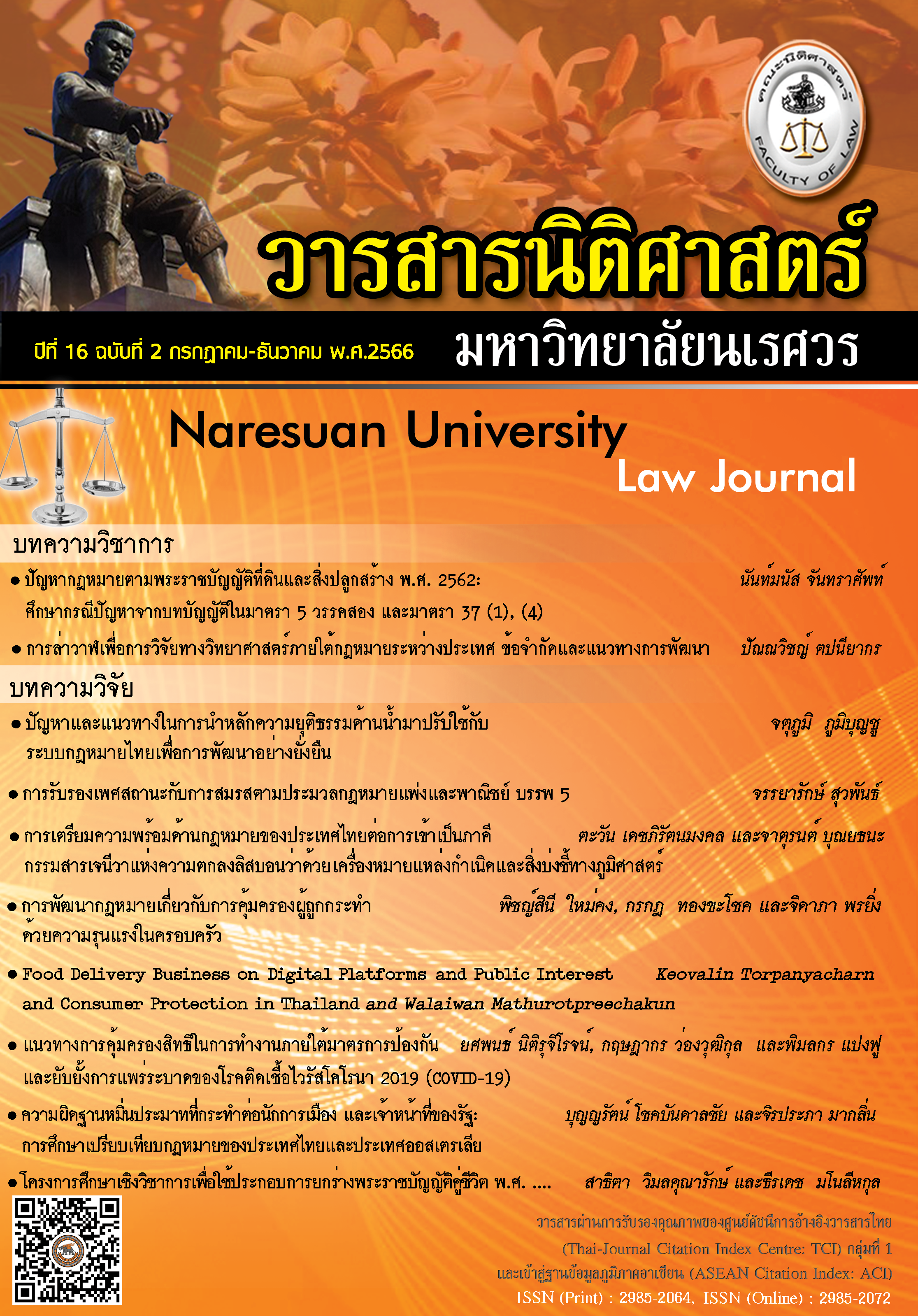Legal Problems under the Land and Buildings Act 2019: Study of Problems from Provisions in Section 5 Paragraph Two and Section 37 (1), (4)
Main Article Content
Abstract
Tax collection for land and buildings under the Land and Buildings Tax Act B.E. 2562, effective January 1, 2020. After the enforcement, it can be seen that there were two problems. The first problem states in section 5 paragraph 4, that the meaning of “buildings” of this section is not included machine, component part or inside equipments. The secound problem points out at section 37 (1) and (4), it sets up the waste or raw land taxation fee higher rate than tax of plantation. The study found that the calculation of the tax base under Section 5, paragraph 4, does not reflect the actual value of the property based on the principle of ability to pay tax, causing unfairness and disparity in tax collection. Regarding the land or building taxation issue under Section 37 (1) and (4), it was found that the criteria used in assessing agricultural land use needed to be more detailed. People take advantage of the gaps in the law by converting fallow or underutilized land into agricultural land. But they don’t have the intention of farming. Therefore, it is proposed to amend the provisions in Section 5, Paragraph 4, of the Land and Building Tax Act, B.E. 2562, and add additional criteria in the relevant notifications of the Ministry of Finance and the Ministry of Interior.
Article Details
References
Criminal Court. “Documents for the Project to Disseminate Legal Knowledge and the Trial of Judicial Officers at the Court of Justice, from the Normal Way....To the New Style of Land Tax.” April 7, 2021. [In Thai]
Farmland Assessment Overview. “New Jersey Department of Agriculture.” Accessed October 10, 2022. https://www.state.nj.us/agriculture/divisions/anr/pdf/farmlandassessmentoverview.pdf/.
Royal Institute. Royal Institute Dictionary 2011. Bangkok: Royal Institute, 2011. [In Thai]
Rungnapha Santithamma. Taxation. Bangkok: TPN Press, 2018. [In Thai]
Siriya Dusitnanon. “Designing Thai Taxation System Based on Good Taxation Principles.” Law Journal Faculty of Law University of The Thai Chamber of Commerce 7, no. 1 (2015): 224-244. [In Thai]
Somkid Bangmo. Business Taxation. Bangkok: S. Asia Press (1989), 2014. [In Thai]
Somporn Fuengkritsada. “The Responsibility of the New Property Tax the from a Less Earner When the New Property Tax Act Legislation Promulgation: The Case Study Less Earner in the Community “Wat Tuek” in Samut Sakhon Province.” Master’s thesis, Chulalongkorn University, 2007. [In Thai]
Suphalak Pinitphuwadol. Explanation of Theory and Principles of Tax Law. Bangkok: Wisdom, 2004. [In Thai]
Suphalak Pinitphuwadol. Land and Building Tax Law. Bangkok: Winyuchon, 2022. [In Thai]
Suphalak Pinitphuwadol. Tax Law. Bangkok: Winyuchon, 2020. [In Thai]
Taweechai Meelarb. “Comparison of the Land and Building Tax Law In Thailand with the Real Property Tax Law in New York, USA: Case Study of the Tax Assessment and Administration Method.” Master’s thesis Independent Study, University of the Thai Chamber of Commerce, 2016. [In Thai]
Taxacctgcenter. “Features of Real Property Taxation in the Philippines.” Accessed October 10, 2022. https://taxacctgcenter.ph/features-of-real-property-taxation-in-the-philippines/.
Thatchalerm Suthipongpracha, and Attakorn Wongpridee. “Comparative Property: A Case Study from 7 Countries.” Journal of Public and Private Management 22, no. 2 (2015): 131-132. [In Thai]
Weerasak Kruethep. Deciphering the Local Taxation of Thailand. Bangkok: Faculty of Political Science Chulalongkorn University, 2013. [In Thai]


